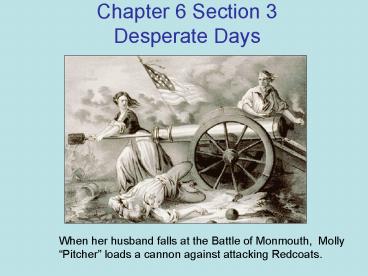Chapter 6 Section 3 Desperate Days PowerPoint PPT Presentation
1 / 11
Title: Chapter 6 Section 3 Desperate Days
1
Chapter 6 Section 3Desperate Days
When her husband falls at the Battle of Monmouth,
Molly Pitcher loads a cannon against attacking
Redcoats.
2
Campaign in New York
- In June, 1776, A huge British fleet carrying
almost 40,000 troops anchored in New York harbor. - By capturing New York City, the British hoped to
split the colonies in two.
3
Battle of Long Island
- Although George Washington had anticipated the
British invasion of New York, his force of 18,000
was no match against the British. - The Battle of Long Island was the 1st in a series
of defeats for Washington and the Continental
army. Washington lost 1500 men to 400 for the
British. - Washington managed to keep his army together,
avoid capture, and retreat into Pennsylvania.
4
Nathan Hale
- After his defeat at Long Island, Washington
desperately needed information about British
troop movements. - Nathan Hale, a young officer, spied for the
Americans but was caught by the British and hung. - Before being executed, Nathan Hale said, I only
regret that I have but one life to give for my
country.
5
Victory at Trenton
- On Christmas night, 1776, Washington secretly
crossed the Delaware River with his army and
attacked Trenton on December 26. - The Americans surprised the Hessians, German
mercenaries hired by the British, and captured
most of them. - Washington won another victory a week later at
Princeton. - The American victories at Trenton and Princeton
gave the army new hope.
6
A Terrible Winter
- On Christmas night, 1776, Washington secretly
crossed the Delaware River with his
7
A New British Strategy
- In 1777, British General John Burgoyne devised a
new plan to win the war by cutting off New
England from the other colonies by having three
armies meet at Albany, New York. - Gen. Howe would march North from New York City up
the Hudson River to Albany. Gen. St. Leger would
march east from Montreal to Albany. Gen.
Burgoyne would march south from Quebec to Albany.
8
Victory at Saratoga
- Instead of marching to Albany, Gen. Howe sailed
his army to Philadelphia and took over the city. - Gen. St Leger was stopped at the Battle of Fort
Stanwix and headed back to Montreal. - Gen. Burgoyne led his army through the woods and
swamps of New York. He was surrounded by
American forces at Saratoga and was forced to
surrender.
9
The Turning Point
- The Battle of Saratoga was important because it
was the turning point in the war - It ended the British threat to New England.
- It boosted American spirits-a large British army
had surrendered. - It convinced France to enter the war as an ally
of the U.S.
10
A Powerful Ally
- In 1776, The Continental Congress had sent
Benjamin Franklin to Paris to persuade the French
king to help the Americans. - Americans wanted an alliance with France because
France could give the U.S. needed supplies and
naval support.
11
Help From Abroad
- Throughout the war, volunteers from Europe
offered to aid the American cause - Marquis de Lafayette brought trained soldiers
from France and fought with Washington. - Thaddeus Koskciusko, a Polish engineer, taught
Americans how to build fortifications and
constructed the defenses at Saratoga. - Casimir Pulaski trained cavalry, or troops on
horseback. - Bernardo de Galvez, governor of Spanish
Louisiana, secretly supplied the Continental Army
with medicine, muskets, cloth, and gunpowder. - Friedrich Von Steuben, a Prussian officer,
drilled Washingtons soldiers and taught them how
to use bayonets. - By Spring, 1778, the American army had become
experienced, well-trained, and more confident.

